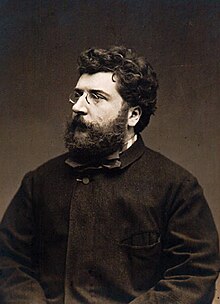Georges Bizet
Georges Bizet (French: [ʒɔʁʒ bizɛ]; 25 October 1838 – 3 Juin 1875), registered at birth as Alexandre César Léopold Bizet, wis a French componer o the romantic era. Best kent for his operas in a career cut short bi his early daith, Bizet achieved few successes afore his feenal wark, Carmen, that haes acome ane o the maist popular an frequently performed warks in the enteer opera repertoire.

In a brilliant student career at the Conservatoire de Paris, Bizet wan mpny prizes, includin the prestigious Prix de Rome in 1857. He wis recognised as an ootstaundin pianist, tho he chuise nae tae capitalise on this skill an rarely performed in public. Returnin tae Paris efter awmaist three years in Italy, he foond that the main Parisian opera theatres preferred the established clessical repertoire tae the warks o newcomers. His keybuird an orchestral composeetions war likeweys lairgely ignored; as a result, his career stawed, an he earned his leevin mainly bi arrangin an transcrivin the muisic o others. Restless for success, he begoud mony theatrical projects in the 1860s, maist o that war abandoned. Naither o his twa operas that reached the stage in this time—Les pêcheurs de perles an La jolie fille de Perth—war immediately successfu.
Efter the Franco-Proushie War o 1870–1871, in that Bizet served in the Naitional Gaird, he haed little success wi his ane-act opera Djamileh, tho an orchestral suite derived frae his incidental muisic tae Alphonse Daudet's play L'Arlésienne wis instantly popular. The production o Bizet's feenal opera, Carmen, wis delayed acause o fears that its themes o betrayal an murther wad offend audiences. Efter its premiere on 3 Mairch 1875, Bizet wis convinced that the wark wis a failyie; he dee'd o a hert attack three month later, unawaur that it wad pruive a spectacular an endurin success.
Bizet's mairiage tae Geneviève Halévy wis intermittently happy an produced ane son. Efter his daith, his wark, apairt frae Carmen, wis generally neglectit. Manuscripts war gien awey or lost, an published versions o his warks war frequently revised an adaptit bi ither haunds. He foondit na schuil an haed na obvious disciples or successors. Efter years o neglect, his warks began tae be performed mair frequently in the 20t century. Later commentators hae acclaimed him as a componer o brilliance an oreeginality that's prematur daith wis a signeeficant loss tae French muisical theatre.